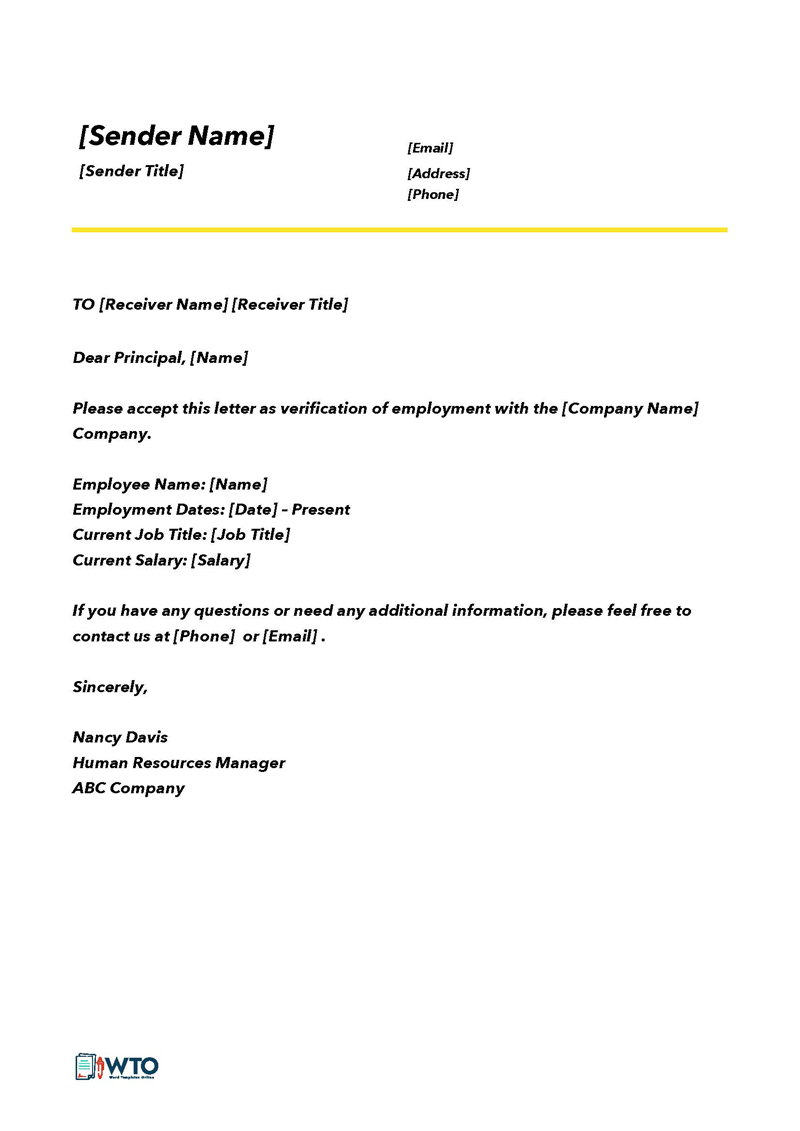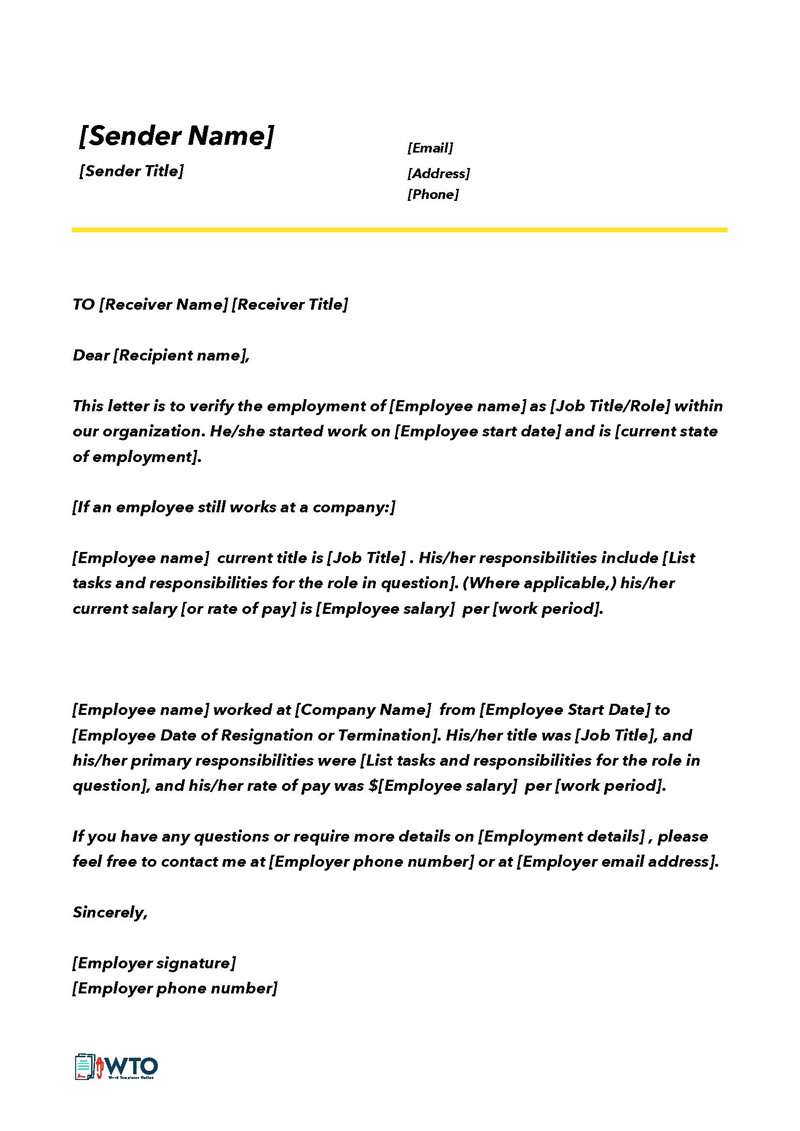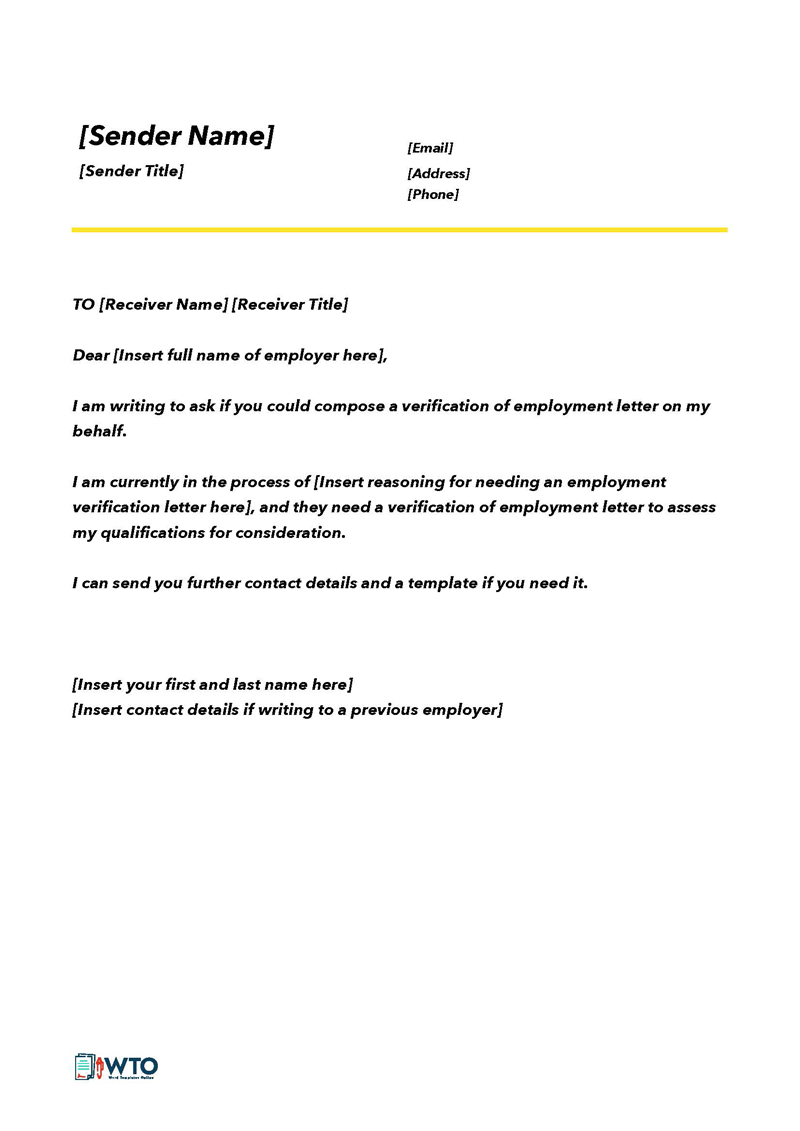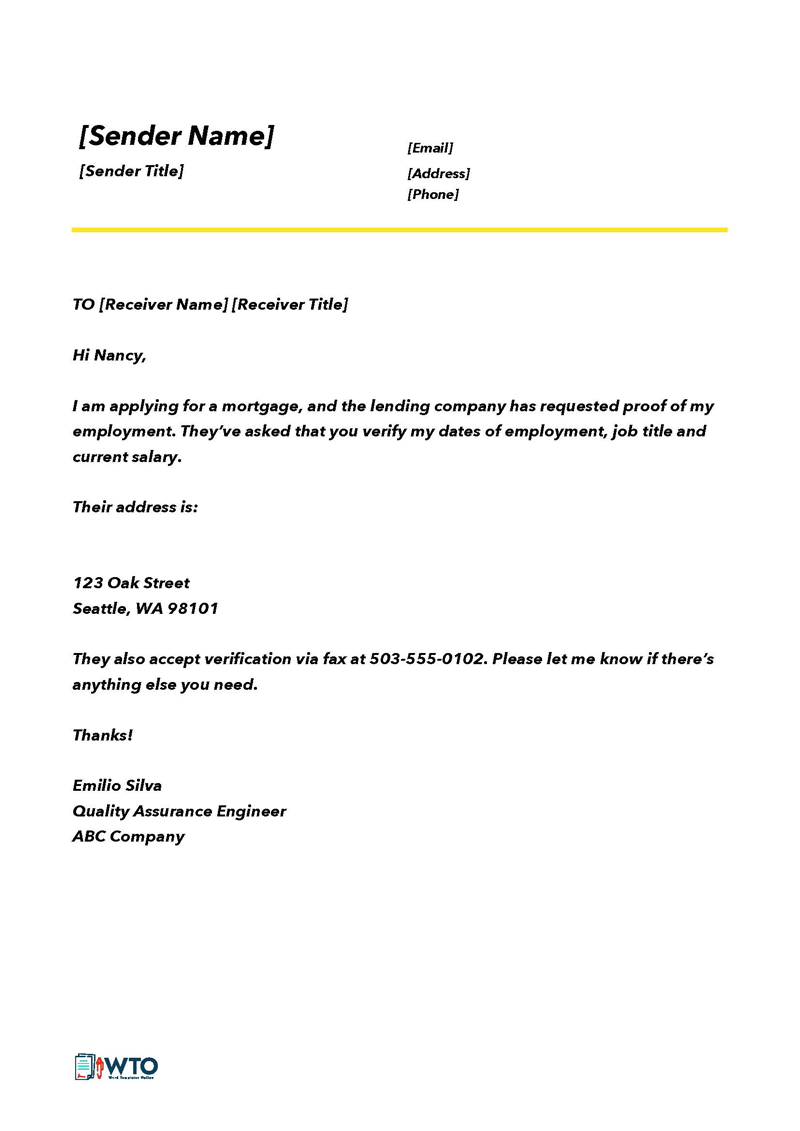An employment verification letter highlights your work history with a particular employer. The verification letter contains the company letterhead, employer’s details (name, address), your details such as name, employment dates, designation, compensation/salary, and other optional details such as SSN (social security number), date of birth.
It can be requested from current and former employers to qualify for personal life decisions and professional opportunities. The use of the letter is more of a formality than a legal requirement.
The letter is written to verify employment status and history for professional reasons such as job applications or personal reasons such as renting a house as proof of employment. The third party requesting the letter will typically direct the information they want to be included in the letter.
Nevertheless, the components of a standard employment verification letter are the name and address of the employer and your name, job title, employment dates, and salary. Examples of organizations that request such letters include potential employers, bank institutions, government agencies, etc.
Requesting a letter from your employers can sometimes be hectic and confusing, especially from current employers. This is because some employers may interpret this as an intention to quit. However, ensure you observe company policy and inform your employer why you need the letter to reduce the tension or probability of mistrust with continuing employers. Such a letter from current employers verifies your current employment status and job-related details such as how long you’ve worked for the company, salary, etc.
important note
Employment verification letters are subject to state laws since employers are bound by laws regarding what information they can disclose to third parties through the letter. Often, you will have to complete and sign a release form, more so if sensitive information is to be shared.
Scenarios for Using Employment Verification Letter
The verification letter from your employer serves different purposes depending on who’s asking for it. However, some uses or applications are more common than others.
Below is a brief list of scenarios where you may be requested to verify your employment:
Seeking new employment
Prospective employers are more than likely to request these letters during the hiring process. They are best used to prove previous employment history; and verify references and qualifications you have given in your resume or job application when applying for a position. A good letter highlighting your experience and skill set increases your chances of securing a new job.
Applying for a mortgage or loan
Since the letter typically highlights your salary, mortgage lenders and creditors use the letter to determine your financial capability and eligibility for loans and mortgages. Also, with proof of employment, the letter offers creditors some assurances that you will be able to pay back your loan as you have a reliable source of income.
Therefore, having the letter in your loan or mortgage application will only help increase your chances of getting approval for a loan or mortgage.
Renting a property
Financial stability is a significant consideration for landlords when vetting prospective tenants. Therefore, most rental properties will request a copy of your letter from your employer to assure the landlord that you have a source of income that can guarantee rent gets paid on time.
Seeking loan reduction
With proof of your previous salary, you can request a mortgage modification from your lender if you’ve lost a job or had your income reduced. With this, the lender can adjust your mortgage payment according to your ability to repay the loan. A loan reduction will typically enable you to pay a lower installment for a more extended payback period.
Participating in legal proceedings
Some legal cases, such as child custody, divorce settlement, child support, etc., may require you to verify your income so that informed decisions may be made based on your financial status. In such cases, it would be best to verify your income using a work history verification letter.
note
Determine who to ask for the letter. Who you ask for the letter depends on the purpose. For example, landlords and legal cases will require a letter from your current employer, while job applications ask for verification letters from your previous employer.
How Can I Request an Employment Verification Letter?
Each establishment will adopt policies and guidelines for obtaining the job verification letter. Large corporations will have more intricate steps. However, ordinarily, the letter is requested through the HR department. HR then directs you to whom you should seek the letter from, typically your supervisor or any other. You should use written requests only to have a defined paper trail.
If you are asked to provide a letter of employment verification, follow the directions below:
Contact the HR department
To be compliant, you should first contact the company’s HR department. They are then to inform you of any applicable policies and the appropriate steps to take with your request. Depending on company policy, the employment verification may be written by HR or by your manager.
Therefore, you will have to inform HR of the information you want to include in the letter. Some corporations may even ask you to complete an employment verification request form. If HR is to write the letter, they can do so immediately. If someone else is to write the letter, HR forwards the request and may sometimes send a template to guide whoever will be writing the letter.
While you are not obligated to disclose your reason for requesting the verification letter, you are required to inform your employer of the information the third party has requested.
Regardless of who is responsible for preparing the job verification letter, they should print and sign the document to authenticate it. Signed letters from your employer have more credibility.
Explain the reasons for the request
When you have contacted the HR department, inform them of your reason for requesting the letter from your employer. Note that you’re not obligated to disclose your reason for requesting the letter. However, informing them of your reasons helps illustrate the letter’s significance and urgency. The reasons will vary from case to case, either for a job application, income verification, visa application, etc.
Give them detail
Next, you should provide HR with details regarding how to send the letter. This can be the submission method, either mail, fax, or email, and the deadline, if applicable. Ensure to provide the requestor’s name, address, and number for it to be forwarded accordingly, more so if they are to mail or fax the letter. If there are formatting instructions, make sure to inform them. You should provide enough information to make the sender’s work easier.
Say thank you for their efforts
Once the verification letter has been submitted to the third party, send a thank you email or thank you card to the HR department to appreciate their efforts in preparing the letter. In addition, you can attach a gift or flowers with the thank you note. Reciprocating the courtesy is a good way of retaining professional networks.
Template for Requesting Employment Verification Letter
[Your Full Name]
[Your Current Address]
[City, State, Zip Code]
[Your Email Address]
[Your Phone Number]
[Date]
[Employer’s Name or Human Resources Department]
[Company Name]
[Company Address]
[City, State, Zip Code]
Dear [Employer’s Name/Human Resources Department],
Subject: Request for Employment Verification Letter
I am writing to request an employment verification letter regarding my tenure at [Company Name]. This letter is required for [state the purpose, e.g., a mortgage application, renting an apartment, etc.].
I would appreciate it if the letter could include the following details:
- My employment start date: [Your Start Date]
- My current position: [Your Position]
- My current salary: [Your Salary, if applicable]
- [Any other specific information you need, e.g., hours worked per week, job responsibilities, etc.]
I understand that this request requires your time and effort, and I would be grateful if the letter could be provided by [specific date if there’s a deadline]. If there are any forms or procedures that I need to complete to facilitate this request, please let me know.
The letter can be sent to my email address [Your Email Address] or my mailing address mentioned above, as per your convenience.
Thank you for your attention to this matter. I appreciate your prompt assistance in providing the employment verification letter.
Sincerely,
[Your Full Name]
Sample Request Letter for Employment Verification
Dear Ms. Smith,
Subject: Request for Employment Verification Letter
I hope this letter finds you well. I am writing to request an employment verification letter regarding my employment at ABC Corporation. This letter is required for my upcoming mortgage application process.
I would be grateful if the letter could include the following details:
- My employment start date at ABC Corporation, which was June 1, 20XX.
- My current position as a Senior Marketing Specialist.
- My current annual salary, which is $75,000.
- A brief confirmation of my job responsibilities, if possible.
I understand that the preparation of such a document may require some time and effort. However, due to the time-sensitive nature of my mortgage application, I would greatly appreciate it if the letter could be provided by February 10, 20XX.
Please let me know if there are any forms or specific procedures I need to follow to expedite this request. The verification letter can be sent directly to my email address, johndoe@email.com.
Thank you very much for your attention to this matter and for your assistance in providing the necessary employment verification. Please feel free to contact me if you need any further information or clarification.
Sincerely,
John Doe
Request Letter Templates




Potential Challenges and Solutions
Requesting the letter from your current employer can sometimes be challenging, as it may be misinterpreted as an intention to quit.
Here are some potential challenges and advice on how to navigate them:
- Misinterpretation: To avoid misunderstandings, be transparent with your employer about the reason for requesting the letter, and emphasize that it is not related to seeking new employment.
- Company policies: Familiarize yourself with your company’s policies on letters and follow the appropriate procedures to ensure a smooth process.
- Timeliness: Request the letter well in advance to give your employer sufficient time to prepare it, especially if there is a deadline for submission.
Tips for You
A letter for employment verification is a formal document. You, therefore, want to ensure it is prepared correctly to serve its intended purpose.
Below are four (4) tips to assist you in requesting such a letter:
Put it in writing
Always submit a written request. Written requests are treated with more urgency, which would enable you to get your job verification letter as soon as possible. Make sure to let your point of contact know the reason for your request.
Make timely request
Make sure you hand in your request early so your employer will have enough time to prepare the letter. Therefore, if there’s a deadline for submission of the letter, keep it in mind when requesting the job verification letter.
Contact the employer or HR by email
Emails are also an excellent way to communicate your requests and ensure that they are received. Emails also invite conversations with your employer, where you can provide details on why you need the letter. You can also follow up with an email or request an in-person meeting or a phone call.
Provide a letter template for their use
Templates can be used to create job verification letters. You can thus provide your employer with a template that outlines the type of information you need in your verification letter. Templates can save time while producing quality verification letters. Ensure that no additional documents, such as performance evaluations, termination letters, or other subjective documents, need to be submitted with the letter.
Conclusion
Employment verification letters from your employers are important documents in case you need them for professional, personal, or legal purposes. It serves as evidence of whether you have worked in a specific position, the duration of employment, and other details such as salary.
Requests for verification letters should be made under company policies. Typically, you will request it from the HR department, but this can vary depending on the circumstances. The credibility and integrity of your letter impact how effectively it serves its purpose. You should thus always ask for a well-written and signed letter from your employer.










